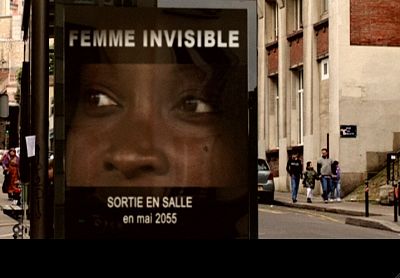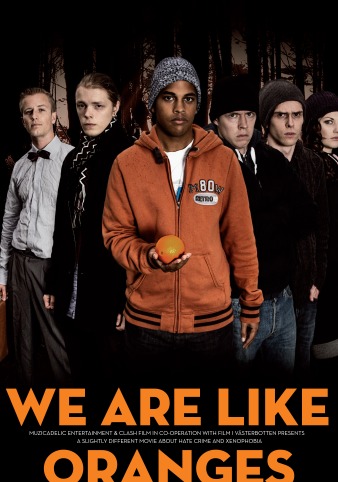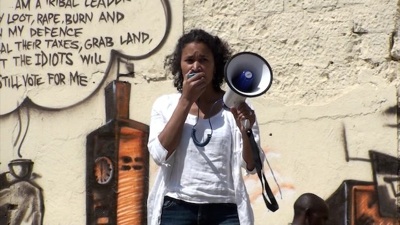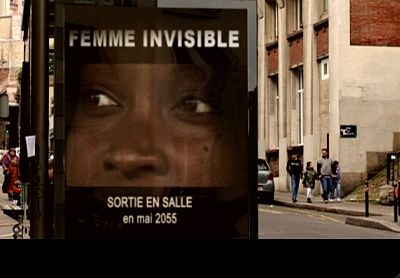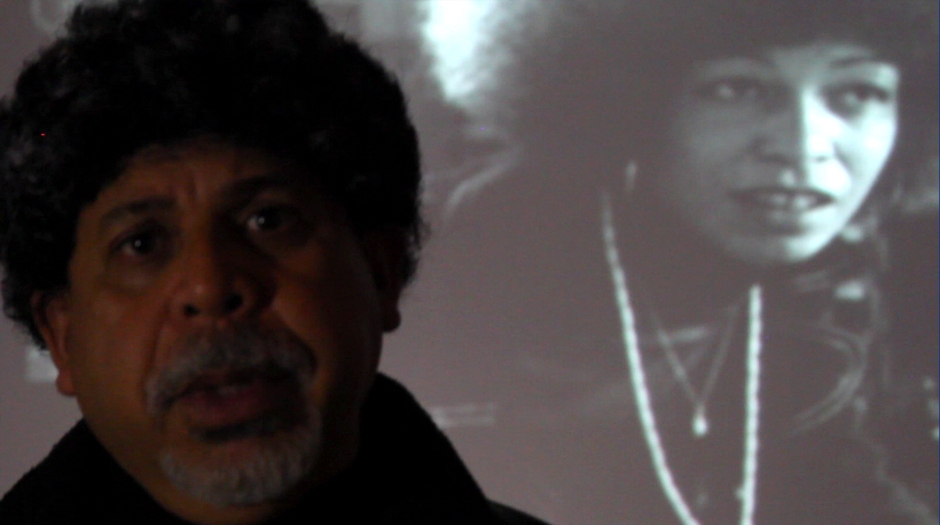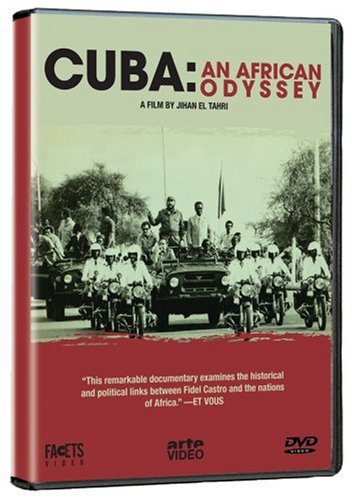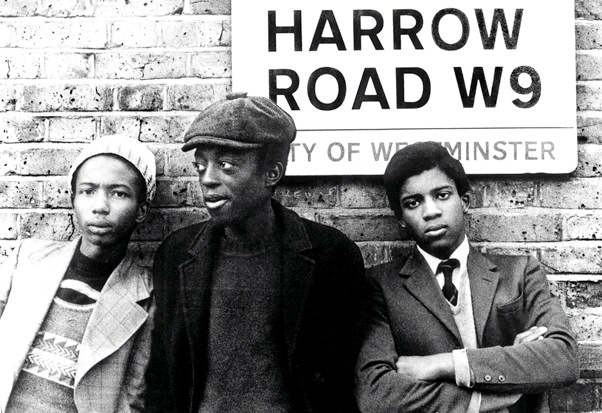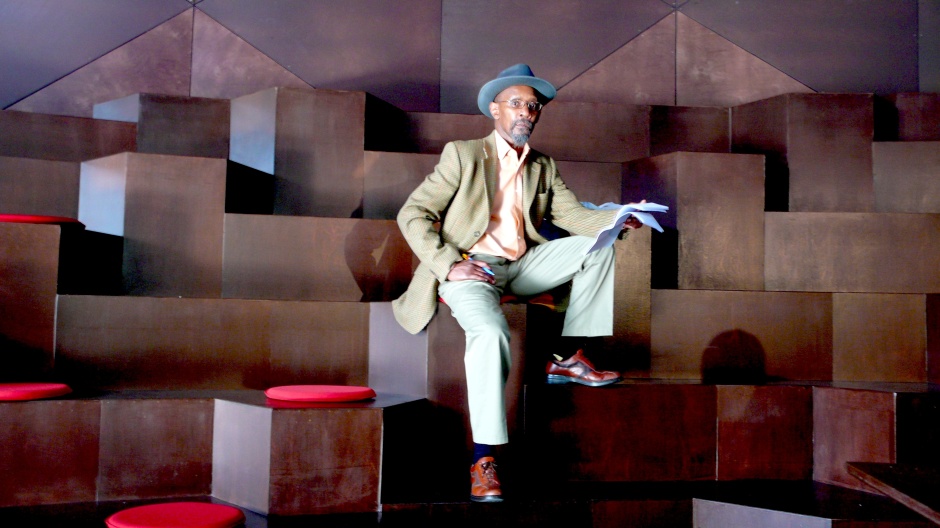Pascale Obolo, Invisible Woman, 2008
Sunday May 19
Hackesche Höfe Kino
Rosenthalerstraße 40/41
10178 Berlin
Day Pass 16/8 €
In Cooperation with AfricaAvenir
Part I
RAIN QUEENS – DIASPORA FILMMAKERS ON TOP
10:00-10:30
Introduction
10:30-11:15
Screening and discussion of new works by
Jeannette Ehlers (2012) 15 min (3 short films) +Ingrid Mwangi Robert Hutter (2012) 4:33
Raúl Moarquech Ferrera Balanquet (2013) 14 min + Pascale Obolo (2012) 15 min
11:15-11:45
Q & A moderated by Quinsy Gario
11:45- 12:00
Coffee Break
12:00-14:00
Cuba. An African Odyssey by Jihan El Thari. 118 min
14:00-14:15
Q & A moderated by Walter Mignolo
14:15-15:15
Lunch
15:15-16:20
Premiere and discussion of Cecilia Garding´s film “We are like Oranges” (2012) 65 min
16:20- 16:30
Q & A Moderated by Simmi Dullay
16:30-16:45
Coffee Break
PART II
MALCOLM´S BROTHERS
16:45- 17:15
Rhetoric that Preaches Revolution by Adler Guerrier (2008) 24 min
17:15-17:25
Making History by Karen McKinnon and Caecilia Tripp (2011) 10 min
17:25-19:25
Pressure by Horace Ové (1975) 110 mins
19:25-20:25
Plenary session moderated by Robbie Shilliam and Alanna Lockward
SYNOPSES AND BIOGRAPHIES
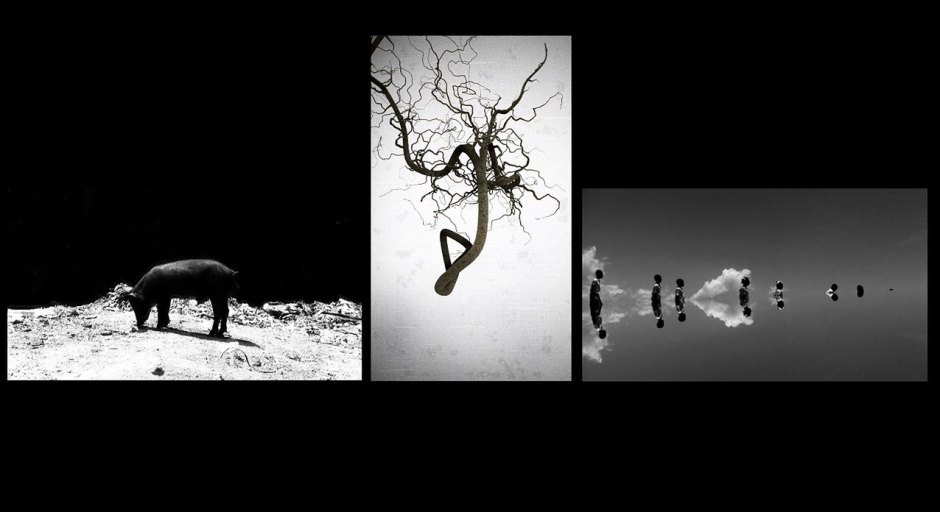
Jeannette Ehlers, Off The Pig, The March, Black Bullets, 2012
Courtesy of the Artist and Art Labour Archives
German premiere
Off The Pig | 2012 | 05:03 min
http://jeannetteehlers.dk/m4v/video17.htm
The March | 2012 | 4:40 min
http://jeannetteehlers.dk/m4v/video18.htm
Black Bullets | 2012 | 4:33 min
http://jeannetteehlers.dk/m4v/video19.htm
Haiti, then called Saint Domingue, was the first country to gain independence in 1804. The Haitian revolution started with a Vodoun ceremony and the sacrifice of a pig. In Off the Pig, Ehlers uses the symbolic interconnection between the Black Panthers’ depiction of oppression through the figure of the pig (as can be seen in the work of Emory Douglas), to honor revolutionary struggles and victories like the Haitian revolution.
Jeannette Ehlersstudied at The Royal Danish Academy of Fine Arts and The Funen Academy of Fine Arts, Copenhagen. Her works explore the Danish slave trade and colonialism worldwide through digitally manipulated photographs and video installations. http://www.jeannetteehlers.dk/
German premiere
By showing an Afro-Swedish man without a troubled or criminal background as the leading hero in her film, Cecilia Gärding analyzes the racist power-structures that have impacted Swedish artistic production. The film investigates the effects of racist histories and practices on human relationships and the ways in which people can and should fight for positive change. The film also emphasizes the positive contributions that Swedes with an immigrant background have made to Swedish culture.
Cecilia Gärding is the leader of “Cultural Heritage Agents”, a project that gives Swedish youth with a foreign background the possibility to analyze the impact of ethnic relations on a variety of art-forms. Via the project, Gärding has contributed to a report advising the 2015 Swedish minister of Culture on cultural diversity policies.
German premiere
In this piece, the artist addresses noise and silencing in a poetic performance in the middle of a busy street corner in Nairobi. The futility of political activism in the face of public disregard is portrayed with a quiet unpretending stance. This action mirrors the atmosphere of the 1960s and the Panthers in particular, in a totally unpredictable manner.
http://www.ingridmwangiroberthutter.com/ingrid_mwangi_robert_hutter/generationzzz_2012.html
Ingrid Mwangi Robert Hutter is the combined name of the duoIngrid Mwangi and her husband Robert Hutter. Working together as video, photography and performance artists, they consider their art as produced by “one artist in two bodies”. http://www.ingridmwangi.de/ingrid_mwangi_robert_hutter/home.html
Invisible Woman is an answer to Ralph Elisson’s novel The Invisible Man, and portrays the search of a black woman in Paris, questioning her identity and her place in French society to the point of madness. Her presence is configured through film posters, hung up in the city.
Pascale Obolo was born in Yaoundé in Cameroon in 1967, and lives and works in Paris. She studied directing at the Conservatoire Libre du cinema Français and obtained a Master of Cinéma at the Paris VIII University. Her films centralize the feminine Hip Hop movement in the French suburbs as well as the place of the Black woman in the cultural industries. She was awarded a silver medal at FESPACO 2013 for her documentary “Calypso Rose”.
German premiere
Mariposa Ancestral Memory is an experimental narrative that connects many themes and historical incidents related to the African Diaspora. Reflected upon are homophobia, racism, Maya and Afro Caribbean queer spirituality, the African-Caribbean writings of Vèvé, Anafourana and Kongo, the US Latina/o migration, the Atlantic Slave Trade, the Mariel Exodus, the imprisonment of Angela Davis in the1970s, and the Black Panther Movement.
Raúl Moarquech Ferrera Balanquet was born in Havana, Cuba in 1958. He gained an MFA in Multimedia and Video Art at the University of Iowa in 1992. Since then he has curated major media arts exhibits in the United States, Canada, Brazil, Cuba and Mexico, among which the InteractivA’ 01 and InteractivA’03 for the Museum of Contemporary Art (MACAY) in Mérida, Yucatán, México.
Behind the so-called Cold War, four adversaries with conflicting interests face off on the African continent: the Soviets want to expand their influence, the United States intend to appropriate the continent’s natural riches, the former empires seek to revive their shaky colonial power, and the young African nations defend their newly-won independence. African revolutionaries like Patrice Lumumba, Amilcar Cabral and Agostinho Neto call on Cuban guerrillas to help them in their struggle. From Che Guevara‘s tragicomic epic in the Congo up to the triumph of the “Battle of Cuito Cuanavale” in Angola, this film tells the story of Cuba’s central role in the revolutionary struggles on the African continent.
Jihan El Thari is an Egyptian-born, French filmmaker, author and news correspondent. She has authored, directed and produced award-winning documentary films, authored books and reported on political conflicts in the Middle East and Africa. Jihan is a Member of the Executive Bureau of FEPACI (Federation of Pan-African Cinema) and Secretary General of The Guilde of African filmakers in the Diaspora. She holds a Bachelor of Arts Degree in Political Science and a Master of Arts Degree in Political Science, both from the American University in Cairo.
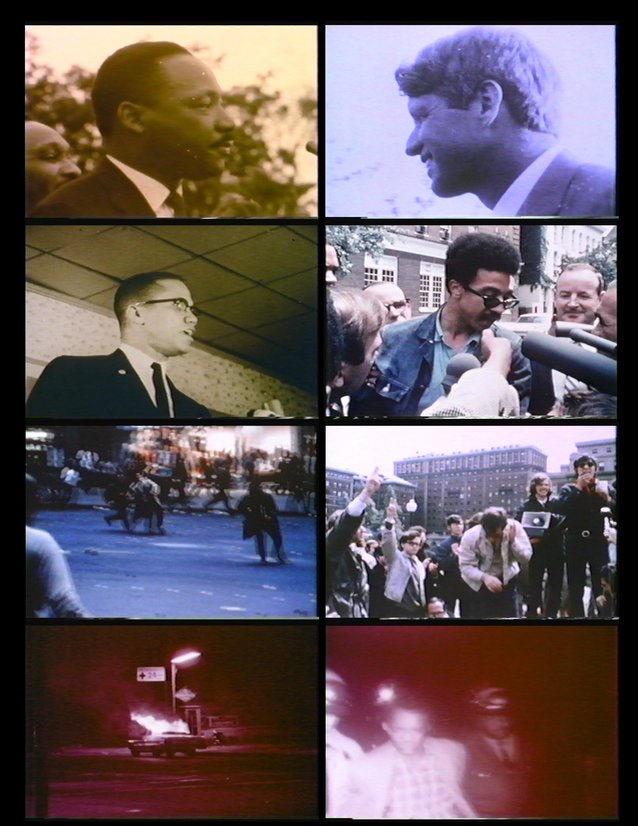
Adler Guerrier, Rhetoric That Preaches Revolution, 2008
Courtesy of the Artist and David Castillo Gallery
German premiere
This piece consists of documentary news footage of world events from the years 1965-1968. It spotlights the young militant artists in Miami who collaborated under the moniker BLCK. The video centralizes the solidarity and combative mood central to the civil rights movement: it depicts the video marches, the protests, the confrontations with the authorities, and the news-coverage of the deaths of Malcolm X, Martin Luther King and Robert Kennedy.
Adler Guerrier was born in Port-au-Prince, Haiti and lives and works in Miami. Subsequent to studies at the New World School of the Arts in Miami, Florida, Guerrier has exhibited at the Miami Art Museum and the 2008 Whitney Biennial. Using a wide variety of media, he improvises between form and function to nimbly subvert space and time in constructions of race, ethnicity and class. He calls upon the democratizing nature of collage and the authority of formal composition to write a contemporary identity critique.
Berlin premiere
Set in Ladbroke Grove, West London, an area with a large Caribbean population since the 1950s, Pressure explores the assimilation (or otherwise) of Caribbean people into British society in the context of the Black Power movement. The film deserves recognitions for both its aesthetic merit, and for the bold way it deals with institutional racism and police brutality, without ever falling into the trap of treating such matters simplistically.
Horace Ové is a British filmmaker, photographer, painter and writer with Trinidadian roots. He is one of the leading Black independent film-makers of the post-war period. For his film Pressure, he holds the Guinness World Record for being the first Black British film-maker to direct a feature-length film. Ové has built a prolific and sometimes controversial career as a filmmaker, documenting racism and the Black Power movement in Britain over many decades through photography and in films such as Baldwin’s Nigger (1968), Pressure and Dream to Change the World (2003).
German premiere
Making History celebrates their friendship and the creativity that sprung up from the Black Power Movement, as it shows two major writers of the Caribbean Diaspora breaking bread together over questions of identity and nation. Édouard Glissant, a contemporary of Frantz Fanon and student of of Aimé Césaire, was nominated for the Nobel Prize for his writings on creolization processes and the “Aesthetics of Relation”. Linton Kwesi Johnson, the father of Dub poetry, joined the Black Panthers in London while still in school and gained fame through his poems about the Panther uprisings in London during the 1970s and 1980s.
Karen D. McKinnon is an American filmmaker based in London, where she attended Goldsmiths College. She wrote “Dance/Art”, for PBS network and was selected for an emerging directors fellowship at Columbia Pictures. She developed a passion for filmic installation after collaborating with artists at the experimental college Santa Monica Art and Design. Her work has been funded by the UK Film Council and shown at the Arnolfini, Galerie Ecole des Beaux Arts,Paris, consonni, Spain and in festivals and galleries across Europe and America.
Cecilia Tripp is an artist, filmmaker and researcher, alternating between Paris, New York and Berliny. Using video installation, photography and performance, her work explores the “play of the trickster” and imagines the collective Symbolic as a space of transgression of social and cultural boundaries. Beyond geographical borders and with a critical eye it deals with forms of freedom, utopia and civil disobedience at the crossroads of globalization and shines a light on the invention of new languages, sounds, cultural codes and social imaginary as a permanent process of “making history”.
